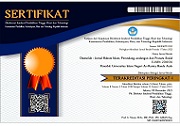CITATIONS
EPISTEMOLOGY OF THE FI'L HADITH AS A PROPOSAL AGAINST MINIMUM NUMBER OF FRIDAY CONCLUSIONS
Abstract
Friday prayer is one of the obligations carried out by Muslims on every Friday. The implementation was carried out in a place known as a mosque. Friday prayers are considered valid if they meet the criteria set by the scholars based on what has been done by the Prophet Muhammad. One of the conditions for a valid Friday is the presence of a congregation of at least forty people. This opinion is held by the Shafi'iyyah. They require the validity of Friday with a congregation of at least forty people. They based it on the actions of the Prophet. (hadith fi'lī) who performed the first Friday with forty people, so that the hadith was used as a proof for the validity of Friday by a minimum congregation of forty people. Therefore, the question arises, how can the epistemology of the fi'lī hadith be used as a mandatory law maker? This is because the fi'l hadith is usually only applied to recommended laws (circumcision). After further investigation, it was found that the Shafi'iyyah made the fi'lī hadith of the Prophet SAW. Those who performed Friday prayers with the number of worshipers at Friday prayers were forty people using the rule that the Prophet's actions were an explanation of the procedures for the Friday prayers themselves, so that the procedures were performed by the Prophet. be mandatory too. In addition, there is no qawl hadith that provides a different explanation from the fi'lī hadith. Therefore, making the fi'lī hadith as a proof for the validity of a worship is considered permissible as long as there are no other arguments against it. The Shafi'iyyah circles make forty as the minimum number of worshipers at a Friday prayer, so Friday is considered invalid if the number of worshipers is less than forty people.
Keywords
epistemology, fi'l hadith and dalil
Full Text:
PDFReferences
‘Alī ibn ‘Umar al-Dār Quṭnī, Sunan al-Dār Quṭnī, Beirut: Dār al-Fikr, t.t.
Abd al-Muluk bin Abd Allah al-Juwainī, al-Burhān fi Uṣūl al-Fiqh, Beirut: Dār al-Kutub al-‘ilmiyyah.
Abī Ishāq Ibrāhīm bin ‘Alī al-Syairāzī, al- Luma‘ fī Uṣūl al-Fiqh Beirut: Dār Ibn Kathīr, t.t.
Al-Syāfi ‘ī, al-Umm, Beirut: Dār al-Fikr, t.t.
Amir Syarifuddin, Ushul Fiqh 2Jakarta: Logos, 1999.
Baihaqī, Sunan Baihaqī, Beirut: Dār al-Fikr, t.t.
Ḥasan al-Mas‘ūdī, Minḥat al-Mughīth Semarang: Mutiara Usaha, t.t.
Ibn Ḥajar al-‘Asqalānī, Fatḥ al-Bārī, Beirut: Dār al-Fikr, t.t.
Jalāl al-Dīn al-Maḥallī, Syarḥ al-Maḥallī, Beirut: Dār al-Fikr, t.t.
Sulaimān ibn Dāwud, Sunan Abī Dāwud, Beirut: Dār al-Fikr, t.t.
Syams al-Dīn al-Qurṭubī, al-Jāmi‘ li Aḥkām al-Qur’ān,Beirut: Dār al-Fikr, t.t.
Taqī al-Dīn al-Syāfi‘ī, Kifāyat al-Akhyār fī Ḥil Ghāyah al-Ikhtiṣār, Beirut: Dār al-Fikr, t.t.
Wahbah al-Zuhailī, al-Wajīz fī Uṣūl al-Fiqh Suriah: Dār al-al-Fikr, t.t.
Zain al-Dīn al-Malibarī, Fatḥ al-Mu ‘īn, Beirut: Dār al-Iḥyā’, t.t.
Zakariyyā al-Bākistnī, min Uṣūl al-Fiqh ‘alā Manhaj Ahl al-Ḥadīth, Beirut: Dār al-Fikr, t.t.
DOI: http://dx.doi.org/10.22373/dusturiyah.v12i1.13270
Refbacks
- There are currently no refbacks.
Copyright (c) 2022 saifuddin sa'dan, Fadli Ibrahim
Indexed by:
Tools:
All papers published in Dusturiyah: Jurnal Hukum Islam, Perundang-undangan dan Pranata Sosial are licensed under a Creative Commons Attribution-ShareAlike 4.0 International License. |
Office address: Fakultas Syariah dan Hukum Universitas Islam Negeri Ar-Raniry. Jl. Ar-Raniry, Kopelma Darussalam, Syiah Kuala, Banda Aceh, Aceh, Indonesia 23111. Email: jurnal.dusturiyah@ar-raniry.ac.id
situs toto slot gacor slot gacor situs toto















